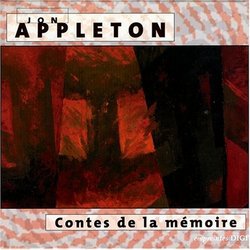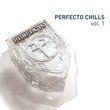| All Artists: Jon Appleton Title: Contes De La Memoire Members Wishing: 0 Total Copies: 0 Label: The Orchard Original Release Date: 1/1/1999 Re-Release Date: 3/25/2000 Genres: Dance & Electronic, Pop, Latin Music Styles: Dance Pop, Latin Pop Number of Discs: 1 SwapaCD Credits: 1 UPC: 669910144329 |
Search - Jon Appleton :: Contes De La Memoire
 | Jon Appleton Contes De La Memoire Genres: Dance & Electronic, Pop, Latin Music
|
Larger Image |
CD DetailsSimilarly Requested CDs |
CD ReviewsAmerican Master of Electro-Acoustic Music Carlos Nakamura (carlosnakamura@hot | Sao Paulo, Brazil | 10/06/1999 (5 out of 5 stars) "Jon Appleton Contes De La Memoire Appleton, an American pioneer of electronic music, might be best known for co-designing the Synclavier and as a founding member of the CIME (Confederation for Electroacoustic Music) and the SEAMUS (Society for Electro-Acoustic Music in the United States). His academic and theoretical associations aside, Appleton has a welcome sense of humor. Take "Newark Airport Rock," a witty 1969 piece in which comments on "the new electronic music" were collected during a random survey of passengers and strung together with a jumbled quasi-Beat arrangement of Moog squiggles and sequenced electronics. Some of the opinions are extremely funny (a few favorites are the clueless "You'll hear it when you want to hear it;" and "We get enough of that in the Army!" "You mean that stuff we hear on the airplanes?" ), others are surprisingly perceptive and revelatory - and the teens who declare that it's "with-it!," "really neat!," "cool," and "a beautiful thing... really nice" give the burgeoning artform a rather prescient stamp of generational approval. "San Francisco Airport Rock," a 1996 sequel constructed with reactions gathered during another (more recent) impromptu survey, finds that not as much as changed as we'd like to think, despite the apparent assimilation of electronic music into the culture of popular music. Again the teens seem most receptive, whether commenting on e-music's noted drug-friendly aspect or on the potential for self-expression in the Computer Age, and the adults tend to be more readily dismissive - "Like the music in the elevators?;" "Oh, it's not real!;" and the popular "I prefer music played by musicians without computers." - with the notable exception of one woman who "met Moog when he first came out with the Synthesizer" and a man enamored of e-music's disreputable sibling, New Age. Name recognition is up - one surveyee impressively namechecks "Koyaanisqatsi" - and, rest assured, Gen X still deems it "great," and - yes, "cool." Even if one girl thinks it "sucks," a trenchant insight which Appleton accents to especially humorous effect. Twenty years later, and it appears that the "new" electronic music still has a way to go in terms of mainstream acceptance. The other pieces on "Contes de la Memoire" span Appleton's prolific career and include both his "signature" works - "Chef D',uvre," a bustling concrete abstraction composed in 1967 exclusively using the sounds of the Andrews Sisters singing in an ad for Chef Boy-Ar-Dee (you have to love this guy!) - and music of more recent vintage (Appleton's comparatively solemn electronics-and-tape paen to a friend's Russian heritage, 1993's "Dima Dobralsa Domoy"). With Appleton's music, whether dating from the earliest days of his experiments with electroacoustics in his Dartmouth University tape studio ("Georganna's Fancy" [1966] and "Spuyten Duyvil" [1967]) or witnessing the refinement and maturity of his compositional techniques, there is always an extraordinary energy and vitality. Timbres swell and scatter; archival recordings and extremely active electronics react to convey a sense of excitement and urgency ("CCCP (In Memoriam: Anatoly Kuznetsov) [1966]," prefiguring "Dima Dobralsa Domoy" and paying homage to the Russian writer's courageous defection). Among Appleton's most advanced "tape-studio" pieces, "Times Square Times Ten" presents Manhattan, 1969, in exacting cross-section, a musical excavation of the City from its busy streets to the subterranean whispers of life in its subway belly. Cutting a vertical swath of city-life with observant precision, "Times Square Times Ten" IS the City in miniature - a sonic core-sample so studiously idealized that it could only have been crafted artificially. Another of Appleton's older tape constructions, 1970's "Homage To Orpheus" revisits the acousmatic tinkles and chimes of Nordheim or Bayle, so convincingly in fact that the composer confesses to feeling distanced from it, and that it "almost sounds like music composed by someone else." No such comment can be made about "In Media Res," a pinnacle of Appleton's digital abstractions. Over nine minutes of gorgeous rippling sonorities, bagpipe-like drones and agitated multitracked synthetics - brought to a sudden close after a section of itchy organ-toned polyphonies. A startling piece of digital composition and yet another example of Appleton's warmth and irrepressible humanness, qualities so critical to the ageless appeal of his innovative oeuvre." What Is Electronic Music? All You Need Is Sushi | California | 06/01/2000 (4 out of 5 stars) "This compendium of Jon Appleton's music will give you a chuckle from time to time, as he asks people in airports "What is Electronic Music?" and you will see what he and other composers have been up against for the last 40 years: the rest of us!Listen to sampling, done before there ever was sampling, on a clever reworking of a canned pasta commercial of the mid-60's.Enjoy a breadth of style, and tangible music in a usually intangible media....Try it - you'll love it!"
|

 Track Listings (10) - Disc #1
Track Listings (10) - Disc #1